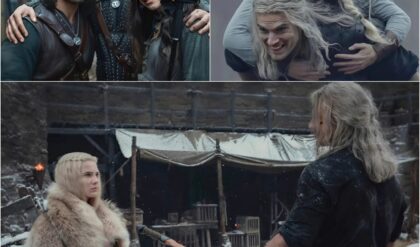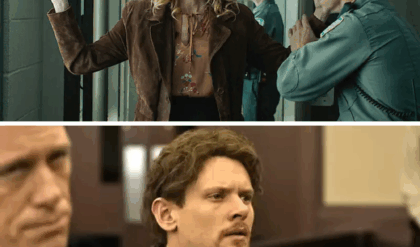For over six decades, Jodie Foster has been a titan of cinema, an artist whose work transcends the screen to touch the very core of human experience. From her debut as a three-year-old in a Coppertone commercial to her Emmy-winning performance in True Detective: Night Country at 62, Foster’s career is a testament to courage, intellect, and an unwavering commitment to truth. Her words about finding strength in the darkness of a character encapsulate not only her approach to acting but also her philosophy of life—a journey of embracing the shadows to uncover profound, universal truths. This article explores how Foster’s fearless dive into complex roles, her evolution as a filmmaker, and her resilience in the face of personal and professional challenges have made her an enduring icon.
A Child Star’s Beginnings: Seeds of Strength
Born Alicia Christian Foster on November 19, 1962, in Los Angeles, Jodie Foster entered the entertainment industry almost by accident. Her mother, Brandy, had taken her older brother Buddy to a casting call when Jodie, then three, caught the eye of agents. By age five, she was appearing in Mayberry R.F.D., and by her teens, she was a household name, starring in Disney films like Freaky Friday (1976) and earning an Oscar nomination for her role as a teenage prostitute in Martin Scorsese’s Taxi Driver (1976).
Even as a child, Foster displayed a preternatural understanding of her craft. She once described acting as more than “saying lines and being yourself,” a revelation sparked by working with Robert De Niro on Taxi Driver. Her role as Iris required her to step into the darkness of a young girl’s exploitation, a challenge she met with raw candor at just 12 years old. This early experience set the stage for her career-long practice of embracing complex, often troubled characters to reveal their humanity.
Foster’s childhood was not without its shadows. Raised by a single mother alongside her siblings, she became a breadwinner for her family, navigating the pressures of fame while grappling with a traumatic event at 18: a stalker’s attempt to assassinate President Ronald Reagan in 1981 to gain her attention. Reflecting on this, Foster wrote in a 1982 Esquire essay, “I wanted to show them all that Jodie was so uniquely ‘normal’ that nothing could make her fall.” This resilience—forged in the crucible of public scrutiny—became a cornerstone of her ability to inhabit the darkness of her characters without losing herself.
The Breakthrough: Courage in Vulnerability
Foster’s transition from child star to leading actress was marked by her Oscar-winning role as Sarah Tobias in The Accused (1988), a film based on the real-life case of Cheryl Araujo. Playing a rape survivor fighting for justice, Foster faced a role that demanded she confront raw pain and societal victim-blaming. She nearly abandoned acting for graduate studies, but gave it “one last try” with The Accused. Her performance, lauded for its fierce authenticity, showcased her ability to channel vulnerability into strength, a hallmark of her craft.
This pattern continued with her iconic portrayal of Clarice Starling in The Silence of the Lambs (1991). As an FBI trainee navigating a psychological dance with Hannibal Lecter, Foster brought a groundbreaking female perspective to the hero’s journey. She described Clarice as a figure quivering with fear yet resolute, defying clichés of the stoic agent. Her trembling hand in the film’s climactic scene, groping through a darkened house, embodied the quote’s essence: stepping into darkness to let truth emerge. The role earned her a second Best Actress Oscar, cementing her as a defining voice in psychological thrillers.
Foster’s choice of roles often reflected her affinity for solitary, duty-bound characters under pressure—women like Dr. Ellie Arroway in Contact (1997), searching for extraterrestrial life, or Meg Altman in Panic Room (2002), protecting her daughter from danger. These characters, emotionally isolated yet resolute, mirrored Foster’s own guarded nature. She once said, “As an actor, I’m always playing solitary characters,” but as a director, she crafts ensemble stories that weave lives together. This duality underscores her ability to find light in the darkest narratives.
Behind the Camera: Crafting Truth
Foster’s directorial debut, Little Man Tate (1991), marked her transition from performer to storyteller. The film, about a gifted child navigating emotional isolation, was deeply personal, reflecting her own experiences as a precocious young actor. Foster’s approach to directing is pragmatic—she likens it to a “book report”—yet her films, like The Beaver (2011) and episodes of Orange Is the New Black and Black Mirror, reveal a keen eye for human complexity.
Her directorial work emphasizes collaboration and trust in actors, a contrast to the “voodoo” directing she avoids. Foster’s three golden rules for working on set include never making actors feel diminished, a principle rooted in her respect for the vulnerability required in performance. Her ability to step into the darkness of a story as a director—whether exploring mental illness in The Beaver or societal control in Black Mirror—parallels her acting process, always seeking the light of truth.
A Foster-naissance: Resilience at 62
In recent years, Foster has experienced what some call a “Foster-naissance,” with standout roles in Nyad (2023) and True Detective: Night Country (2024). In Nyad, she played Bonnie Stoll, the coach and friend to long-distance swimmer Diana Nyad, earning her fifth Oscar nomination. The role resonated personally, as Foster and co-star Annette Bening aimed to show that “sixtysomethings are not just a bag of bones.” Her portrayal was vibrant, grounded, and a celebration of resilience in later life.
True Detective: Night Country saw Foster return to her crime-solving roots as Liz Danvers, a caustic police chief in an Alaskan town shrouded in polar night. The role, which earned her an Emmy and a Golden Globe, allowed her to support the Indigenous narrative of her co-star Kali Reis, reflecting Foster’s commitment to meaningful storytelling. She described the project as one she could “talk about for the rest of my life,” a rare sentiment in her career.
Foster’s recent work reflects a newfound freedom. At 62, she feels unburdened by expectations, saying, “Something happened the day I turned 60… I don’t really care about things anymore.” This liberation allows her to take risks, from supporting roles in indie projects to leading major series, always guided by her passion for stories that move her.
A Legacy of Truth
Foster’s career is a mosaic of courage, from her childhood defiance of typecasting to her adult insistence on authenticity. She has navigated a male-dominated industry, microaggressions, and personal traumas, emerging as a leader who fosters collaboration on set. Her advocacy for underrepresented voices, seen in her support for Indigenous narratives in True Detective, and her commitment to meaningful work over fame, underscore her integrity.
The quote—“In my career, I find strength in daring to step into the darkness of a character, so that the light of truth can emerge”—is more than a reflection on acting; it’s a manifesto for living. Foster’s willingness to confront the shadows, whether in her roles or her life, has illuminated truths about resilience, identity, and the human condition. Her performances as Clarice, Sarah, or Liz Danvers resonate because they offer a mirror to our own struggles, reminding us that truth often lies just beyond the darkness.
As Foster continues to evolve, her legacy grows not only through her accolades—two Oscars, four Golden Globes, an Emmy—but through the lives she’s touched. She remains a beacon for artists and audiences alike, proving that strength is found in vulnerability, and truth is the light that guides us home. In her own words, “Being an artist is a way of saying, I am here, and this is what I stand for.” Jodie Foster stands for truth, and her career is a radiant testament to that pursuit.





